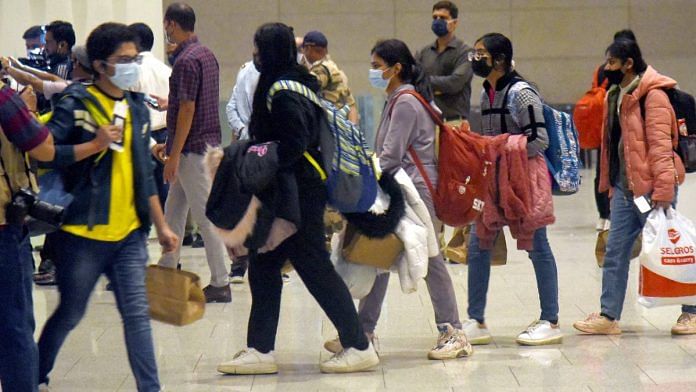
New Delhi: ‘Organise yourselves in small groups/squads of ten Indian students’, ‘conserve and share food and water’, ‘avoid full meals’, ‘learn two or three sentences in Russian’ — these are among the ground rules and safety guidelines issued by India’s Ministry of Defence for the country’s nationals stuck in Ukraine.
Among the basic sentences in Russian that stranded Indians are being advised to learn are ‘we are students’, ‘we are not combatants’, ‘please do not harm us’ and ‘we are from India’.
The ministry’s guidelines also asked Indians not to pick up or handle weapons, and not to react in an abrupt, hasty manner when stopped by military personnel in war-torn Ukraine.
The guidelines, which have been issued for the first time in the recent past, came at a time when frantic efforts are on to extricate, and then evacuate Indian students caught in an escalating conflict around them, with Russia stepping up its bombardment of large cities and towns in recent days.
Such guidelines were not issued during the Afghanistan, Wuhan, Yemen and Libya evacuations over the last decade.
Here’s the full text of the advisory issued by the defence ministry.
Also read: ‘Gunmen asked why don’t you join our fight’: Indian students recall nightmare of exiting Ukraine
Ground Rules/Dos
- Compile and share information with your fellow Indians.
- Remain mentally strong/Do not panic.
- Organise yourselves in small groups/squads of ten Indian students/within that organise buddy/pair system/nominate a coordinator and a deputy coordinator in each group of ten persons.
- Your presence and whereabouts must always be known to your buddy /small group coordinator.
- Make a WhatsApp group, compile details, names, address, mobile numbers and contact in India/share geolocation on WhatsApp with Control Room(s) in Embassy or in New Delhi, update information every 08 hours, keep frequent head count (every 08 hours), Group/Squad coordinators to report their location to control rooms/helpline numbers.
- Only coordinator/deputy coordinator should communicate with local authorities/Embassy/control rooms in India to conserve phone batteries.
Survival Guidelines
- Keep ready a small kit of essential items on persons or at hand round the clock.
- Emergency kit should contain Passport, ID Card, essential medication, life-saving drugs, torch, matchbox, lighter, candles, cash, energy bars, power banks, water, first-aid kit, headgear, muffler, gloves, warm jacket, warm socks and a comfortable pair of shoes, as available.
- Conserve and share food and water: avoid full meals, eat smaller portions to extend the rations. Stay hydrated. If you find yourself in an open area/field, melt snow to make water
- If available, keep one large garbage bag per person to use as ground matting/cover against exposure to rain/cold/storm/during forced march/evacuation
- If injured or ill, intimate condition and seek advice from control room/helpline/WhatsApp.
- Delete all unnecessary apps in mobile, limit conversations to low volume/audio mode to conserve battery.
- Stay indoors, preferably in designated safe zones, basements, bunkers.
- If you find yourself in the streets, walk on the sides of the roads, close to the cover of buildings, crouch low to avoid being targeted, do not cross streets, avoid city centres, downtown areas. Turn around street corners in urban areas with great caution
- In each designated group/squad, keep a white flag/white cloth for waving
- Learn two or three sentences in Russian (e.g., we are students, we are not combatants, please do not harm us, we are from India)
- When stationary, do regular deep breathing, mild movement of limbs to maintain good blood circulation
- Pack minimum personal belongings (other than the emergency kit) preferably in small backpack suitable for long trek/walking
- Be ready to move under instructions at short notice/do not carry large bags to avoid slowing down, fatigue and crowding
- If stopped by military check-post or by police/armed personnel/militia, cooperate/obey/raise your hands with open palms facing forward above your shoulders, Remain polite, provide necessary information, contact the control room/helpline when possible without confrontation
- Movement for evacuation should be done in coordination with authorities as guided by control room/helpline
Don’ts
- Avoid stepping out from your bunker/basement/shelter at all times
- Do not go to downtown/crowded areas
- Do not join local protestors or militia
- Refrain from commenting on social media
- Don’t pick up weapons or any unexploded ammunition/shells
- Do not take pictures/selfies with military vehicles/troops/soldiers/check posts/militia
- Do not try and film live combat situations
- In the event of warning sirens, take immediate shelter wherever possible. If you are in the open, lie flat on your stomach and cover your head with your backpack
- Do not light fires in enclosed spaces
- Do not consume alcohol/refrain from substance abuse
- Do not wear wet socks to avoid chilblains/frostbite. Wherever possible, remove your shoes and dry your socks and other wet belongings
- Avoid unstable/damaged buildings and be mindful of falling/flying debris
- Stay away from glass windows to avoid injury from flying glass during explosions or gunfire
- At check-posts, do not alarm the armed personnel by suddenly reaching for things/documents in your pockets unless told to do so. Do not engage in sudden or jerky movements when confronted by armed personnel.
(Edited by Saikat Niyogi)
Also read: ‘Putin should ensure safety of Indian students’ stuck in Ukraine, says Kyiv envoy to New Delhi

COMMENTS